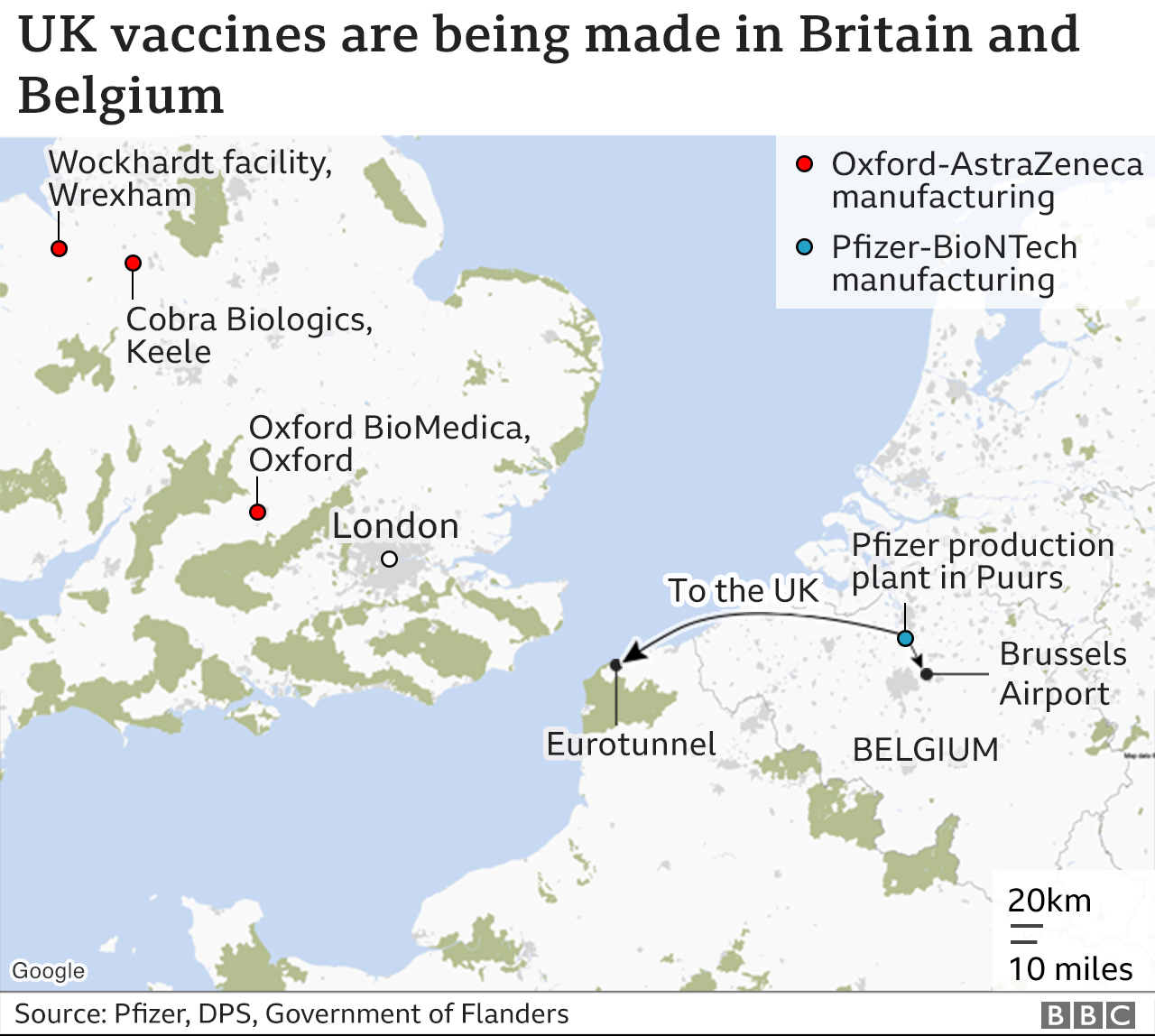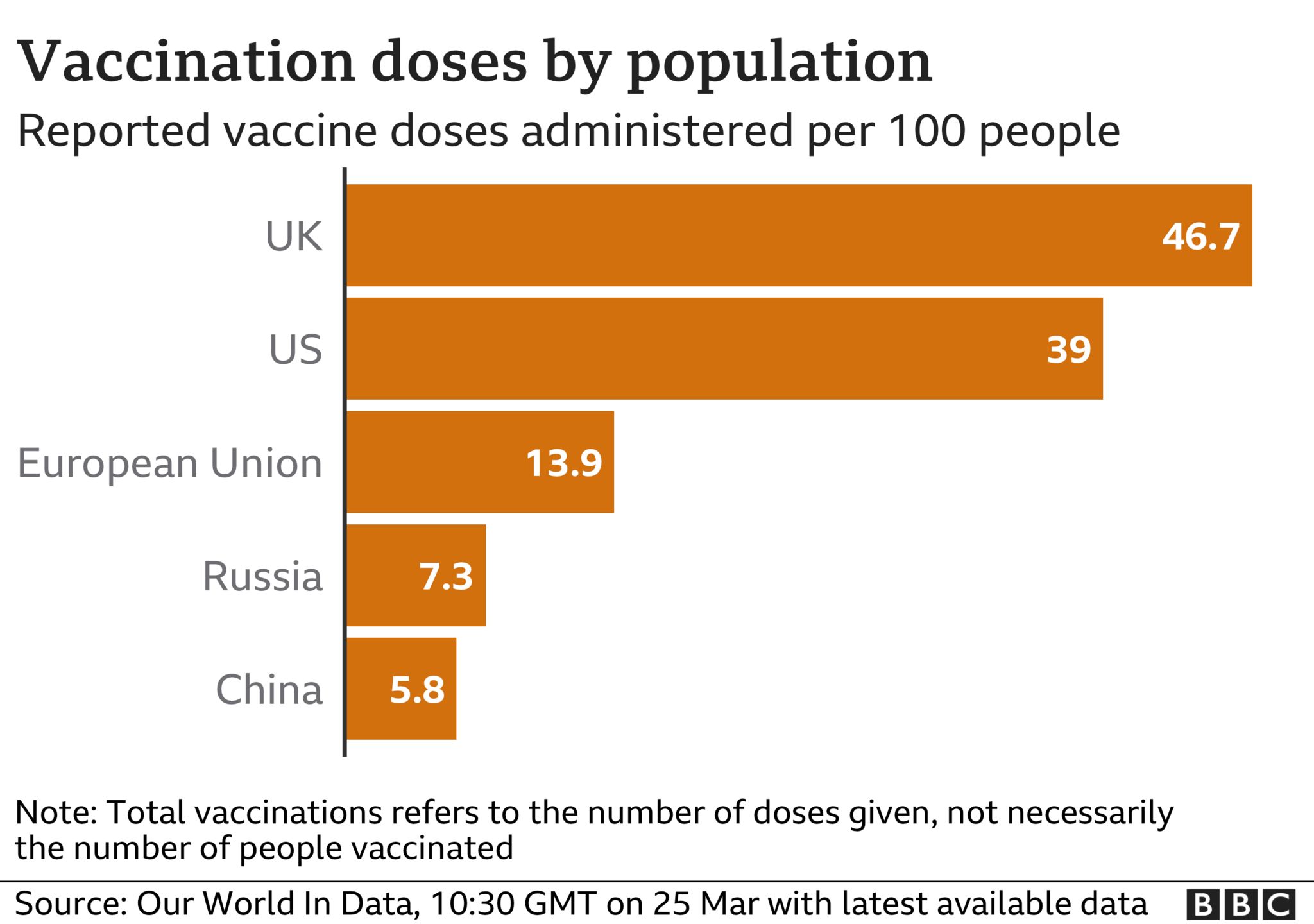Would EU export curbs affect UK vaccine rollout?
The EU warns it could ban exports of vaccines made in the bloc but would such a move affect the UK?…

- Published
- 16 hours ago
 image copyrightGetty Images
image copyrightGetty ImagesThe European Union has said it could curb the export of vaccines produced in member states in order to speed up its own rollout.
Such controls could affect supply to the UK, where Prime Minister Boris Johnson has warned against imposing “blockades”.
What vaccine measures is the EU planning?
The EU is unhappy with pharmaceutical companies – primarily AstraZeneca – who, it says, have not delivered promised doses.
The European Commission has also complained that, while 10.9 million doses of the Pfizer vaccine have been exported to the UK from the EU, no doses have come the other way.
The UK government has not confirmed whether this is the case but insists no ban is in place.
Under the EU’s new proposals, decisions on whether to export vaccines to another country would be based on:
- how many jabs or components that country itself is exporting
- its infection and vaccination rates
Where does the UK get its Oxford-AstraZeneca vaccine from?
The Oxford-AstraZeneca vaccine is made in the UK at two sites: in Oxford and Keele. A third plant in Wrexham puts the vaccine into vials and packages them up for distribution.
The UK has ordered 100 million doses. Almost all will come from within the UK, but 10 million doses are being made by the Serum Institute in India.
Half of these have already been received, with half held up by delays.

Why is the EU unhappy with this arrangement?
The EU says the UK is receiving preferential treatment in its contract with AstraZeneca.
In January, AstraZeneca said it would have to cut the number of doses it could deliver to the EU. It blamed production delays in Belgium and the Netherlands.
The full details of the company’s deals with the UK and the EU have not been made public. But analysis by the Politico website points to a clause in the UK’s contract which says the government “may terminate the deal and invoke what appear to be punishment clauses” if there is a delay in supply.
According to Politico, the EU waived its right to sue the company in the event of delivery delays. The European Commission says it is now involved in a “dispute mechanism” with the company.
Where is the EU’s AstraZeneca vaccine manufactured?
The EU has ordered 400 million doses of the Oxford-AstraZeneca vaccine.
The company says supplies are coming mainly from the US and a site in Seneffe in Belgium. AstraZeneca is working with suppliers in 15 countries to make the vaccine.
A site in Leiden in the Netherlands is also expected to produce vaccines for both the EU and the UK.
AstraZeneca confirmed the UK had not received any vaccines or components from the EU – apart from one “tiny” batch from the Leiden plant.
Is the EU running out of AstraZeneca doses?
No – in fact, EU countries have been reporting hundreds of thousands of unused doses because of a drop in public confidence in the jab.

As of 22 March, France had distributed 1.4 million out of 2.7 million doses available, while Germany received 3.4 million but used only 1.8 million. The Netherlands had used only 38% of its supply.
In most other EU countries, the proportion of unused AstraZeneca vaccine is much higher than the proportion of unused Pfizer jabs.
What about other vaccines?
The Pfizer jab is mostly made in Puurs in Belgium, and a manufacturing site has also been set up in the German town of Marburg.
Vaccines may be produced in one place but “filled and finished” – put into vials and prepared for export – in another.
And some components used in making the vaccine may be made at yet another location. For example, the UK company Croda is supplying a component to Pfizer to make its vaccine.

